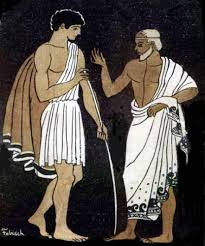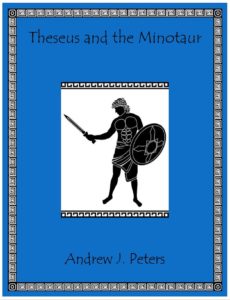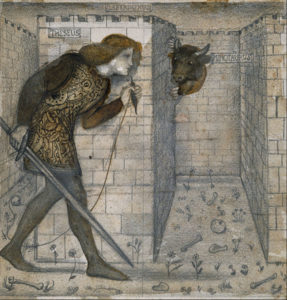It’s story time again here, and this week’s installment comes from one of my very favorite Greek myths.
I wouldn’t be surprised if most people haven’t heard of Nerites. He didn’t make it into Edith Hamilton’s seminal work on Greek mythology, and though he earned a Wikipedia entry, it’s pretty sparse. According to the Theoi Project, a comprehensive glossary of mythological figures, his story comes from the Greek historian Aelian (c. 2 A.D.) who wrote about how a spiral shell of exceptional beauty came to be called a nerite. He claimed the story was well-known among sailors.
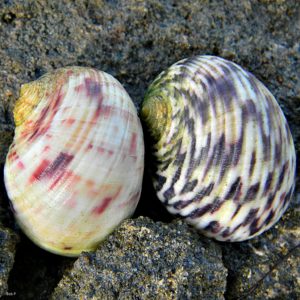
Nerite shells, image retrieved from Wikipedia commons
Aelian told the story thusly: Nerites was the son of Nereus, a sea-god, sometimes referred to as the Old Man of the Sea, and Doris, a river goddess who was the daughter of the titan Oceanus. Nereus and his sea nymph daugthers the Nereids were previously noted by several of Aelian’s predecessors. Homer mentions Achilles’ mother Thetis as a Nereid, as is Calypso from The Odyssey, for example. There are said to be fifty Nereids, but only one Nerites, which was one of the curiosities that led me to retell a little story about him. What would it be like to grow up with fifty sisters?
After that brief introduction, Aelian tells two different versions of Nerites’ tale. Both involve Aphrodite and Poseidon, but the outcome of their dealings with Nerites differ.
Both versions say Nerites was a beautiful youth beyond compare (among many other young heartthrobs like Ganymede and Narcissus in fact), and he attracted the interest of Aphrodite who offered him wings if he would be her lover. Nerites refused the goddess, and to put him in his place, Aphrodite turned him into a snail.
Nerites’ sisters begged the god Poseidon to change him back, and he obliged. The mighty sea god was smitten from the sight of the boy, and he offered to make him his charioteer. Nerites agreed, and Aelian says they lived together happily ever after as companions and lovers, even mentioning that the word for mutual, requited love – anteros – derives from Poseidon and Nerites’ love affair.
I thought that was sweetly sentimental and refreshing. I can’t recall any stories of things going well when a god falls in love with a mortal, or a demi-god. In most cases their love interest is forcibly taken. So it goes with the most famous same-sex myth about Zeus and Ganymede, and in others, like Apollo and Hyacinth, the mortal ends up getting killed.
Well, that’s one version. Aelain also recounts a different story in which Aphrodite isn’t the villain, but it’s the god Helios who was jealous, either because he didn’t like Nerites challenging his notoriety for driving a magical chariot, or because the beautiful boy couldn’t be coerced to serve him. So Helios turned Nerites into a snail.
I like the other version better. 🙂
So here in setting up my story, I’ve almost written more than the story itself. I really just wanted to write a brief portrait of Nerites and portray a moment in his life. Without further ado, here’s my story of Nerites.
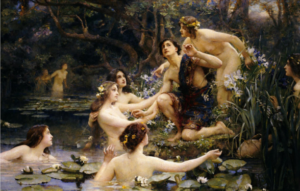
This painting is probably meant to depict a young man falling captive to a group of sea nymphs, but it also made me think of Nerites among his beautiful sisters, retrieved from neetwizard.wordpress.com
He combed through the rocky beach, while the tide troughed and swelled, clacking and spitting as it met the shore. He was in search of sea shells. Spiral conches. Black scallops that shone silvery-blue when they caught the glint of the sun. Those were his favorite. If he could find enough of them, he would string them together with ribbons of kelp and fashion a girdle like his sisters wore. Though his would be different, as befitted a boy.
His sisters were inland, high above on the island aerie, all fifty of them, braiding their hair, sewing circlets of pelican feathers to wear around their necks, sunning themselves, or simply gazing out to sea, like a flock of bedded gulls. Such diversions were no longer enough for a boy of sixteen years. His legs were restless and yearned to roam. His eyes thirsted to see more of the world. There was not much of the island he had not trod, but he had not visited this cove beneath the westward cliffs for its shore was gnarled and clogged with boulders, a poor spot to go swimming or to catch anchovies in the shoals.
He wound through outcroppings of black stone, crouching, stretching, and making himself small to look into pockets in-between, to dig his hand inside to feel around. His compact limbs were dusted with sun-whitened, downy hair, and they were strong and well-suited for foraging along the rugged shore. His feet were calloused and good for gripping footholds on the rocks. At times, he had to push aside from his eyes his golden, curled hair. His sisters only cut it once a year, for his birthday, and that had been many suns past.
They called him their ‘little savage’ or ‘little beast.’ He did not know anything of savages to quarrel with them. As for beasts, was he a crab, scrabbling through the beach? Or a sandpiper, pecking between the rocks? He could swim all day long, so perhaps he was more like a fish, though he could not live beneath the water as much as he had tried. His sisters had told him their father was a titan who had a palace at the bottom of the sea. His mother was a goddess who only came to shore to birth their children. And he the last, a misfit in a tribe of beautiful girls. He used to think he would change someday, developing breasts and curves like his sisters. But he knew now he was different. He had yet to decide whether that was for good or ill.
At last, he spotted a pearly conch, there in the sea-soaked pebbles behind a boulder. It was no bigger than the pad of his thumb. He laid atop the boulder, hanging over the side and stretching his hand to grab it. He grasped the shell, closed it in his fist. His now. Pulling himself up, he sat cross-legged on the face of the rock to admire his find. The conch was smooth and pointy and delicate. He touched it to his cheek to feel its textures and then he touched it to his tongue. It tasted like the sea and had tiny freckles like the backside of his hand.
He turned to what sounded like a cyclone upon the sea. And it did look like that at first, except the sun shone bright in a clear blue sky. He had never known a storm to rise from the water, yet his eyes beheld that very sight. He could not look away from it.
Or was it an enormous cresting wave, kicking up legions of spray while it roared to shore? Thinking to improve his view, he stood up from the rock. Within the foamy hail of seawater, now only yards from shore, he glimpsed things that could not be real. A man therein reining a pair of seahorses with forelegs and hooves clopping on the water?
He rubbed his eyes, looked again. Now, he was certain. A man rode the blue-green sea in a chariot pulled by creatures whose top halves belonged on land and bottom halves belonged beneath the water. That impossible mystery was heading purposely toward him. He looked up to the island promontery, scoured the land for his sisters, wondered if he should hide or flee.
Before he could commit himself to anything, the sea beasts reared and brayed on the water, some ten paces from where he stood, their fist-sized nostrils flaring, their hooves kicking up a briny squall that nearly drenched him.
The charioteer’s eyes were upon him.
He thought of course of his father. They had never met, but Nereus, from whom he was named, was said to be the Old Man of the Sea. Then, his sisters had also talked about all manner of fantastical creatures who lived in the ocean: sea dragons, mermaids, and monsters with the heads of bulls and the tails of fish. Though none could say what a man who lived at the bottom of the ocean looked like.
Some instinct disavowed that this visitor was his father, however. This charioteer of the ocean had the bearing of a stranger, and he was older but not old. By his might, the massive trident spear he carried, and the impossible conveyance by which he traveled, he could not be impressed by their encounter, but he held himself quietly, dispassionately, as though he did not wish to startle the boy from their acquaintance. The sea, the wind turned gentle as though bowing to his command.
He had never seen a man, never dreamed of a being built so powerfully, so admirably. The charioteer had wild, dark beards, thick wind-swept hair, and dark eyes, which trembled with fierce emotion. His shoulders, arms and chest were broad and thickly muscled, so strong, he looked like he could wrestle one of his steeds. His gaze never broke from the young man, and he, who had never been clothed in anything besides seaweed necklaces, periwinkle bracelets, he felt for the first time modest in such a state.
“Who are you?” the stranger said. A deep voice which brooked no lies.
“I am a boy.”
The charioteer narrowed his brow. “That is plain to see. What name did your father give you.”
He gulped. “He named me Nerites.”
A quiet smile. Nerites smiled as well. He liked looking at the man. When he breathed in, his smooth skin took on a crystal blue irridescence like a sunlit shoal.
“Do you know who I am?” the man said.
Words rushed from the boy’s lips. “Are you the soul of the sea?”
“No. I am not your father. Would that I could sire a boy as beautiful as you. No, Nerities. I am the Sea’s champion. Bearer of wind and wave. I am Poseidon of Mount Olympus.”
A god. Nerites’ jaw dropped. His sisters had taught him the names of many gods, though having never seen such a magnificent being, he had not been sure whether they were tales to amuse and shock a younger brother who knew so little about the world.
He could think of nothing to say in return, so he held out his hand and unclenched his fist to offer the perfect shell he had found.
The god looked at his hand, and a miracle happened. In a blink, the shell transformed into a gilded armlet, exactly sized to fit around Nerites’ upper arm. He could not explain the magic, but he knew the god had done it. The band was rare and noble. He slid it through his hand and upward to his bicep. He was no longer a naked boy. He was a prince.
“Would you like to drive my chariot?” the god said.
His eyes widened. To hold the reins of giant seahorses. To skate above the waves. Nerites nodded vigorously.
Poseidon beckoned him, and he dove into the sea, swimming to the chariot and taking the god’s big hand to pull him aboard. The god made room for him to stand in front, and he showed Nerities how to hold the ropes attached to the horses’ bridles. Nerities could not fathom what the ropes were made of. They were lighter than any form of cord he had ever held, and he only needed to give them the faintest lift or pull, and they responded to his command. Magicked.
Nerites glanced at Poseidon, and he nodded. Nerites shook the reins as he had seen the god do, and the horses whinnied and galloped forth. The momentum threw him back, but Poseidon stood sturdily behind him. He placed his hand on Nerites’ bare shoulder. It was warm and strong. He would not let him fall.
So he drove the horses faster, farther from the island, out to sea. Waves parted to make way for him. Wind whipped against his face. A school of dolphins surfaced from the water, racing, jumping to follow him—he, the charioteer of a god. Nerites laughed, and then he dug into driving the chariot faster. There were oceans to explore, islands to see, an infinite world unveiled.
 Share on Facebook
Share on Facebook



